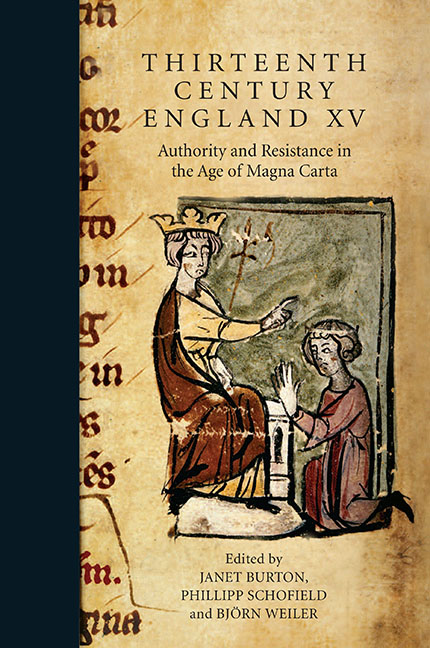 Thirteenth Century England XV
Thirteenth Century England XV Narratives of Resistance: Arguments against the Mendicants in the Works of Matthew Paris and William of Saint-Amour
Published online by Cambridge University Press: 11 June 2021
Summary
The rise of the new mendicant orders, foremost the Franciscans and Dominicans, is one of the great success stories of thirteenth-century Europe. Combining apostolic poverty with sophisticated organization and university learning, they brought much needed improvements to pastoral care in the growing cities. Their preaching, especially, established a new intensity of religious communication and enabled far-reaching cultural transformations. But this success story was not without its undercurrent of resistance.
Most British readers are well aware of this. ‛Anti-fraternal’ or ‛anti-mendicant’ criticisms and satire feature prominently in the writings of Wyclif and Chaucer, to mention just the most familiar names. The many anti-fraternal themes and tropes, forerunners of later anti-clerical argument, form a well-known part of late medieval culture. Yet their very familiarity may cloud our view of them. In his 2012 study, The Making of Medieval Antifraternalism, Guy Geltner reminds readers that there are very specific teleologies attached to the topic. His book begins with the deconstruction of an anecdote in which Chaucer beats down a friar in the street, encapsulating several issues of religious and political identity. In British research at least, resistance to the influence of the mendicants is associated with ideas of religious and political progress towards an anti-papal, modern England.
If the horizon is extended further, it quickly becomes clear that the problem is more general: other research traditions on the mendicants have also been shaped by narratives of modernization, and resistance against them is a topic tied up tightly in these conflicting stories. Based on Catholic traditions or on a Weberian, secularizing outlook, for example, much French (and later international) research tended to see the mendicant thinkers of the thirteenth century as a vanguard of rationalization and learning and thus of a different version of modernity. Especially in research focusing on the rise of papal power, canon law and scholastic theology, the friars, led by learned champions like Raymond of Peñafort (d. 1275), Thomas Aquinas (d. 1274) and Bonaventure (d. 1274), were seen as heralds of a different kind of ‛progress’. Resistance to this – professionalized canon law, growing bureaucracy, ultimately the elements of modern government – appeared futile. The main spokesperson of opposition to the mendicants in the thirteenth century, the aggressive Paris theologian William of Saint-Amour (d. 1272), who battled the friars in highly inflammatory polemics using apocalyptic motifs, has therefore usually been cast as a ‛reactionary’.
- Type
- Chapter
- Information
- Thirteenth Century England XVAuthority and Resistance in the Age of Magna Carta. Proceedings of the Aberystwyth and Lampeter Conference, 2013, pp. 157 - 178Publisher: Boydell & BrewerPrint publication year: 2015
